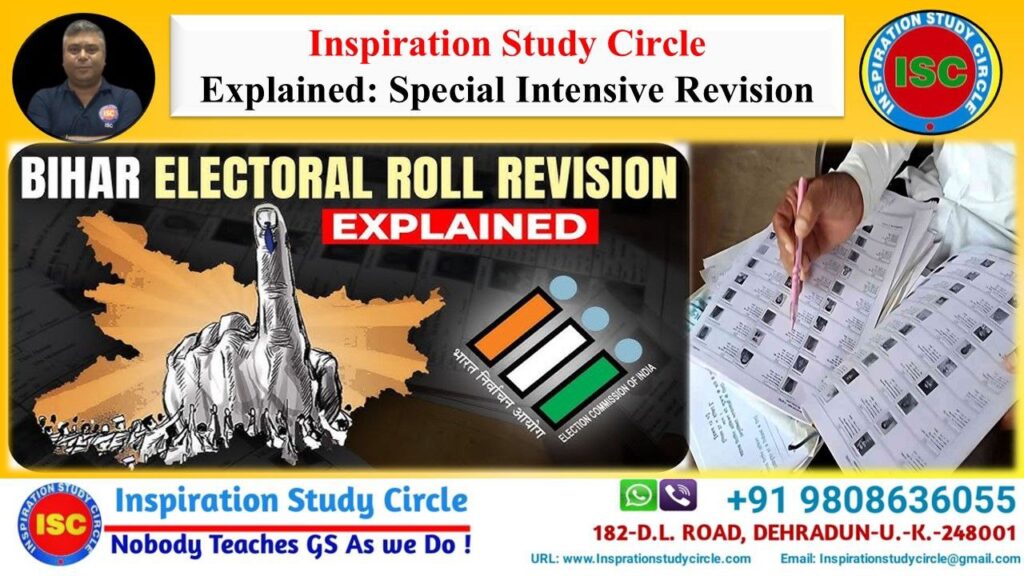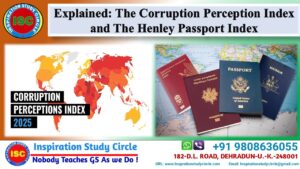Explained: Special Intensive Revision of Electoral Rolls
Table of Contents
Inspiration Study Circle Explained: Special Intensive Revision of Electoral Rolls
House-to-house verification to be done to ensure the enrolment of all eligible Citizens.
Political parties are to be encouraged to participate actively in the revision process.
The Election Commission of India (ECI) today issued instructions for conducting a Special Intensive Revision (SIR) in the State of Bihar, as per the guidelines and schedule specified by the Commission. The objective of an intensified revision is to ensure that the names of all eligible citizens are included in the Electoral Roll (ER) to enable them to exercise their franchise, no ineligible voter is included in the electoral rolls, and also to introduce complete transparency in the process of addition or deletion of electors in the electoral rolls. The last intensive revision for Bihar was conducted by the Commission in the year 2003.
Various reasons, such as rapid urbanization, frequent migration, young citizens becoming eligible to vote, non-reporting of deaths, and inclusion of the names of foreign illegal immigrants, have necessitated the conduct of an intensive revision so as to ensure integrity and preparation of error-free electoral rolls. The Booth Level Officers (BLOs) shall be conducting a house-to-house survey for verification during the process of this intensive revision.

What is the Electoral Roll?
Article 324 of the Constitution provides that the superintendence, direction, and control of the preparation of electoral rolls for the conduct of elections to Parliament and the state legislature shall vest with the ECI. Article 326 provides that every citizen who is at least 18 years of age shall be entitled to be registered as a voter (elector).
The electoral rolls are prepared by the ECI as per the provisions of the Representation of the People Act, 1950 (RP Act). The rolls are prepared for every assembly constituency separately, and the Lok Sabha constituency roll shall consist of the rolls of assembly constituency segments in the parliamentary constituency. There shall be for each State a Chief Electoral Officer (CEO); for each district a District Election Officer (DEO); for each assembly constituency an Electoral Registration Officer (ERO) and Assistant EROs to assist the ERO. These officers are designated or nominated by the ECI in consultation with the state governments. In addition, Booth Level Officers (BLO) are designated for the purpose of preparation, updating, and revision of electoral rolls.
Section 16 of the RP Act disqualifies a non-citizen from being enrolled in the electoral roll. Section 19 provides two additional conditions for being registered in the electoral roll: (a) is not less than 18 years of age on the qualifying date, which is the 1st day of January, April, July, and October of the year; and (b) is ordinarily resident in a constituency.
Section 20 of the RP Act provides the meaning of the term ‘ordinarily resident’. It specifies that a person shall not be deemed to be ‘ordinarily resident’ in a constituency only on the ground of owning or possessing a dwelling house therein. However, a person temporarily absent from his place of ‘ordinary residence’ shall continue to be ‘ordinarily resident’ therein.
Persons who are –
(a) members of the armed forces of the Union;
(b) armed police force of a state serving outside that State;
(c) employed by the Government of India in a post outside India or
(d) holding a constitutional office declared by the President in consultation with the EC, like President, Vice-President, Governor of a State, Ministers in the Union or State Council of Ministers,
are considered, along with their spouse, to be ‘ordinarily resident’ in the constituency where they would have been ‘ordinarily resident’ but for such posting.
Section 20A was added in 2010 to enable Non-Resident Indians who have shifted out of India, even for the long term, on account of education, employment, or otherwise, to register and vote in the constituency in which their address according to their passport is located.
What does Article 326 say?
Article 326 of the Constitution stipulates that:
- every person who is a citizen of India &
- who is not less than 18 years of age on the qualifying date &
- is not otherwise disqualified under any law
shall be entitled to be registered in the electoral roll
In exercise of its powers under Article 324 of the Constitution & Section 21 of the RP Act 1950, the Election Commission of India has directed a Special Intensive Revision (SIR) in the state of Bihar with 01.07.2025 as the qualifying date.
Need for SIR
Special Intensive Revision (SIR) is necessary for several key reasons, including ensuring accuracy and preventing fraud in voter lists by removing ineligible voters and correcting errors. It also helps maintain an updated and error-free roll. Additionally, SIR addresses changes brought about by demographic and administrative shifts such as urbanization, migration, and the addition of young citizens, which necessitate intensive revision for electoral roll integrity.
- Maintaining the integrity of the Electoral Roll (ER) is fundamental for the conduct of free & fair elections
- To ensure that all eligible citizens are included in the ER & no eligible voter is excluded from the ER
- To ensure that no ineligible voter is included in the ER
- To eliminate the names of dead/shifted/absentee voters
- The last Intensive revision in Bihar was conducted by the Commission in the year 2003 with 01.01.2003 as the qualifying date.
The Last SIR that was carried out in 2003
The last such SIR was carried out for Bihar in 2003. Since elections to the Bihar assembly are due in November 2025, it has laid down the guidelines for SIR of the Bihar Electoral Roll (BER) with the qualifying date as 1st July 2025. In the last SIR, the enumerators were sent for house-to-house verification with a copy of the details containing the existing voters. However, in the present SIR, every existing elector will have to submit an enumeration form to the BLO. For electors registered in the electoral roll as of January 2003 (basis of the last SIR), no further documents are required to be submitted except the extract of the electoral roll of 2003. In respect of electors registered after January 2003, they have to additionally submit documents for establishing the date and place of birth for themselves and their parent(s) as required. The schedule for the current SIR is as in Table 1.
Schedule for SIR in Bihar
The schedule for the current SIR is as in Table 1.

A further appeal with the District Magistrate (within 15 days of publication of the final electoral roll) and from his/her order with the CEO (within 30 days) is possible under the provisions of the Registration of Electors Rules, 1960(RER).
Special Emphasis on Migrant Labourers
One other issue that has been raised by the petitioners against the SIR in the Supreme Court is that this process is turning out to be a mechanism for verifying the citizenship of individuals by the ECI.
According to the Constitution and provisions of the RP Act, it is only citizens are entitled to vote in an election in India. However, the requirement to submit proof of date and place of birth of not just the voters but also their parents, for persons enrolled after 2003, is a herculean task not just for the voters but also for the BLOs and EROs who need to verify them. The ECI is not the authority under law to establish the citizenship of any person; this lies with the Home Ministry. The task of verifying the documents in such a short span to establish the citizenship of voters enrolled after 2003, roughly around 3 crore voters, is of gigantic proportions.
While non-citizens need to be excluded from the roll, eligible citizens should not be wrongfully excluded due to non-submission of valid documents. Till now, the ECI has relied on Aadhaar and self-declaration for the enrolment of new voters. Rule 8 of the 1960 RER states that when the ERO, for preparation of the electoral roll, requests information from the dwellers in a constituency, such persons shall furnish information called for therein to the best of their ability.
Way Forward
While conducting the special revision, the ECI shall scrupulously adhere to the Constitutional and legal provisions regarding eligibility to be registered as a voter and disqualifications for registration in an electoral roll, which are laid down in Article 326 of the Constitution of India and Section 16 of the Representation of the People Act, 1950, respectively.
Following Section 23 of the Representation of People Act 1950, the eligibility conditions to enrol as an elector were already being verified by the ERO to his satisfaction. Now, to ensure complete transparency, it would be necessary that the documents on which the satisfaction of ERO is based are also uploaded to ECINET, as the current level of technology enables this. However, these documents shall be accessible to authorized election officials only keeping in view the privacy issues.
While all efforts shall be made by the Election Commission of India that the revision process is carried out in a smooth manner, causing minimum inconvenience to the electors, ECI shall be seeking active involvement of all political parties in the process by appointing their Booth Level Agents (BLAs) in all polling booths. The active participation of BLAs would ensure that discrepancies, if any, are resolved at the preparation stage itself, thereby reducing the instances of filing claims, objections, and appeals. It may be underscored that both the electors and the political parties are the most important stakeholders in any electoral process, and it is only with their full participation that an exercise of such magnitude can be conducted smoothly and successfully.
Disclaimer: The above information is compiled using statistics and articles from the Press Information Bureau and The India Forum.
Recent Post

UKPSC- PCS 2026 Prelims Test Series
UKPSC- PCS 2026 Prelims Test Series Table of Contents UKPSC- PCS 2026 Prelims Test Series The Uttar Pradesh Provincial Civil

Explained: India AI Impact Summit 2026
Explained: India AI Impact Summit 2026 Table of Contents India AI Impact Summit 2026 India AI Impact Summit 2026 The India

The Corruption Perceptions Index, and The Henley Passport Index
The Corruption Perceptions Index, and The Henley Passport Index Table of Contents The Corruption Perceptions Index, and The Henley Passport

India- USA Interim Trade Agreement (2026)
India- USA Interim Trade Agreement (2026) Table of Contents India- USA Interim Trade Agreement (2026) In early February 2026, India and

Explained: India- EU FTA “The Mother of All Deals”
Explained: India- EU FTA “The Mother of All Deals” Table of Contents India- EU FTA “The Mother of All Deals

UPPSC- 2026 Calendar Released
UPPSC- 2026 Calendar Released Table of Contents UPPSC- 2026 Calendar Released Brought to you by Inspiration Study Circle UPPSC- 2026
